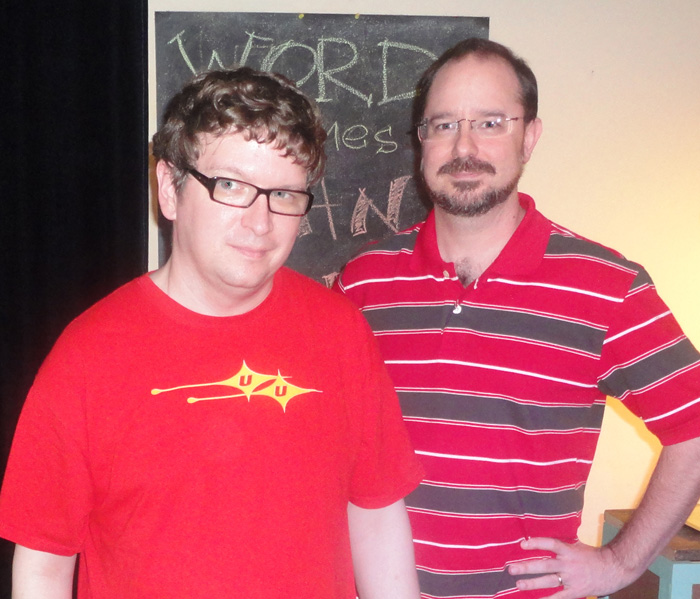Read This: Redshirts

Last week, I went out to WORD Bookstore to celebrate the publication of my friend John Scalzi’s latest novel, Redshirts. It’s built off a concept that many science fiction fans, and certainly every Star Trek fan, will instantly recognize: There’s a certain level of starship crew member who, when sent out on a mission with more prominent, higher-ranking officers, isn’t going to be coming back alive. Although the term “redshirts” has achieved a generic level of recognition, it comes from those episodes of the original Trek series, where landing parties almost always seemed to consist of Kirk, Spock, one other billed cast member, and one poor wretch in a red shirt.
(You’ll notice that I’m wearing a red shirt of my own in the photo above; it’s the official Redshirts red shirt, no less!)
If you’re at all familiar with Scalzi’s work, Redshirts starts out with a structure that’s very reminiscent of his debut novel Old Man’s War, as we’re introduced to Andrew Dahl and some of the other new ensigns who’ve just joined the crew of the Universal Union starship Intrepid. They spend a lot of time talking through their situation, as they start to realize that the Intrepid has a very high rate of crew fatalities—and that other crew members have also figured this out and are going to great lengths to avoid being assigned Away Missions. Eventually, though, Redshirts takes a markedly different turn into metafictional territory. I don’t want to give too much away here, but the crazy hermit character living behind the starship’s walls ranting about “the narrative” will point you in the right direction relatively quickly; the real question is, what’s Dahl going to do with that knowledge? (I can’t even tell you the name of the Trek fanfic story this very vaguely reminds me of, and which I’d love to know whether Scalzi’s read, because if you’re at all familiar with Trek fanfic it’d pretty much tell you what the back half of Redshirts is about.)
Scalzi plays a lot of this as explicit comedy, allowing us to laugh at a bunch of genre conventions (including some that, in other stories, turn into shortcomings when they’re executed poorly). Oddly enough, though, it’s just when the story turns ostensibly ridiculous that it also becomes increasingly poignant, encouraging us to care more about Andrew Dahl and, in the three “codas” that follow the conclusion of the main storyline, some of the other characters who populate his reality. Though I compared it structurally to Old Man’s War, I think it also has a lot in common with another previous Scalzi novel, Agent to the Stars—a comic novel that gradually sneaks in some serious philosophical questions, integrating them deftly into the fictional set-up so it’s not just a philosophy term paper disguised as a novel, but an entertaining story. As WORD’s event coordinator, Jenn, said in introducing Scalzi to the audience at the story, it’s her (and my) favorite metafictional SF since The Princess Bride. And if you’ve never read any Scalzi before, it’s an effective starting point…
19 June 2012 | read this |

 Our Endless and Proper Work is my new book with Belt Publishing about starting (and sticking to) a productive writing practice.
Our Endless and Proper Work is my new book with Belt Publishing about starting (and sticking to) a productive writing practice. 
